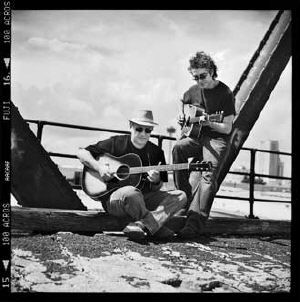| Reunited (and it feels so good): Sergio Lara (left) and Joe Reyes. |
As the nation mourned the casualties of the terrorist attacks on the World Trade Center and the Pentagon, the Latin Grammys were swiftly canceled. Air travel not an option, Lara & Reyes drove back to San Antonio for the annual Jazz'SAlive festival. Before
| LARA & REYES: BALCONES HEIGHTS JAZZ FESTIVAL WITH PLANET SOUL 8pm Fri, Aug 11 Free Crossroads Mall 4522 Fredericksburg Rd |
So, after 12 years, six albums, and countless gigs, the duo amicably split four years ago, in 2002. Lara returned to his birthplace of Mexico City to pursue work opportunities, record a solo CD, and start his own label. Reyes became the most valuable player on the San Antonio rock scene, bringing his effortless virtuosity to Buttercup and the Swindles. The two old friends fell out of touch, and wondered whether they'd ever play together again.
It's one of the miracles of Lara & Reyes' chemistry that their guitar parts seem to instantly mesh every time they sit down to play together, regardless of how long they've been apart. When Lara returned to San Antonio last year, they found that their sabbatical from the acoustic-group setting had done them good. The result is Lara & Reyes, their first album in six years, and a reaffirmation of the potency of their musical interplay. Both guitarists found that working without the expectations of a record label, which tended to cast them in a modern flamenco vein, liberated them to explore facets they'd only hinted at previously.
"We weren't limited by anything," Reyes says. "We could do anything we wanted. We started the record with basically the same style of production we'd done before, but at a certain point, we decided that we didn't need the percussion. It was probably beneficial for our career when we were in the midst of that deal with Higher Octave to have that direction. But after a nice break from it, we could come back fresh and really enjoy it, and do what we want to do."
The decision to eschew percussion also came out of Lara's concern that the duo might fall so easily into their old playing patterns that they'd duplicate themselves. Before they started work on the album, he said to Reyes, "We can't make Rocky VI." As part of their attempt to avoid the sequel syndrome, they used a combination of steel- and nylon-string guitars, whereas previous albums had relied exclusively on nylon strings. The distinction, which may be subtle to some ears, brings a rootsy American feel to what had generally been a Latin and international sound.
When Lara & Reyes met in the late 1980s, Lara had returned to San Antonio after an ill-fated attempt to take his instrument-building business to Nashville. Reyes was playing in the jazz fusion group Fine Line, and just beginning to assert his presence on the local club scene. A mutual friend who hosted a world-music show on KSYM told Lara she knew the perfect musical collaborator for him, and she put the two guitarists together.
"Pretty much, the chemistry was immediate," Lara says. "We've never taken ourselves seriously, but we take our music really seriously, and that's really hard to find. Because a lot of people that want to be in the music business, they think it's party time. They don't do what it takes to be good.
"When I met Joe, I knew that it was not going to be a waste of time. He was really fast to catch up to stuff, and he would have ideas. And from the personal standpoint, it clicked immediately. Even though we were very different, and he had hair down to `his back` and looked like an MTV rockstar from the '80s."
The duo worked tirelessly for more than a decade, building an intensely loyal following among guitar acolytes. "It was kind of a music that was sort of unique at the time, too," Reyes says. "The nouveau flamenco wave hadn't actually reached Texas yet. And when we first put the repertoire together, it contained a bunch of new-grass songs, some gypsy-jazz, and some of the Latin stuff."
The range of the group's tastes is showcased on their reunion disc, cross-pollinating flamenco and bluegrass with the appropriately titled "Flamgrass," expertly paying homage to the Parisian jazz of Django Reinhardt and Stephane Grappelli on "Le Gret," visiting the Mississippi Delta for the slide-guitar workout "Possum Blues," and even dropping faint hints of the pop classic "Our Day Will Come" into the giddy "Old Wolf."
For all their instrumental mastery, Lara & Reyes view themselves as players rooted in a popular, not classical, tradition. Lara says that when he talks about spending the last few years deepening his musical knowledge, people assume he traveled to Andalucia, Spain, to learn from the gypsies. "Forget it," he says, with a laugh. "I went to Clarksdale, Mississippi, and to Memphis. I went to Sun Studio and Beale Street."
While Reyes's busy playing schedule precludes the duo from touring to support the album, they will continue to play once a month at Austin's Elephant Room, and they seem content to work independently of record-label pressures.
"Lara & Reyes is so special and I want to keep it special," Lara says. "People come to us with tears in their eyes and say, 'Do you know how much joy your music brings us?' We're not going to mortgage Lara & Reyes for peanuts. We had a great deal with a great label, and there's no way I'm going to sign anything if it's not at least what we had."
Reyes adds: "Keeping the project like this at least keeps it fun for us, and that's the most important thing. Life's short and I just don't want to be involved in something where it's work."
















